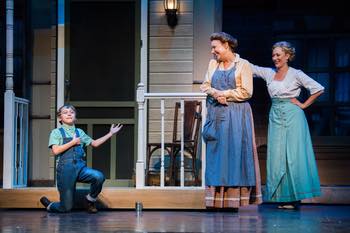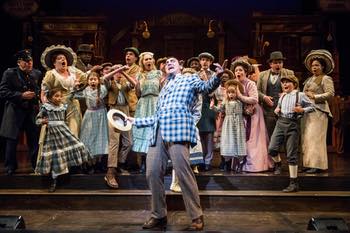Through Sun 11/10
How many ways to say “wonderful?” Meredith Willson’s beloved classic, The Music Man, now at Playhouse Square’s Hanna Theatre inspires a search for fresh adjectives to describe this lively look at small town life in 1912. Director Victoria Bussert and her cohorts make every minute engaging, from overture to triumphant finale.
The Music Man won Best Musical at the 1957 Tony Awards. In the right hands (and this Great Lakes production is), it’s still easy to see why: terrific score, romantic storyline, and engaging, loveable characters (even the villains turn loveable despite their villainy). It’s just fun to imagine living in 1912 River City, Iowa (at least in the Disneyfied version of Willson’s River City we see here).
Costumes by Tracy Christensen reflect turn-of-the-century small-town style with strait-laced, corseted (one imagines) ladies, gentlemen wearing fedoras, and kids with caps. A simple storefront scene (plus a tiny house porch and a bridge added when needed) designed by Jeff Herrmann is set off by lighting designer Jesse Klug.
To begin this nostalgic story, young Winthrop Paroo (Ian McLaughlin) walks onstage, sees a tiny xylophone, and with fewer than ten notes begins to play “Seventy-Six Trombones.” Hidden under the stage, a compact orchestra, attentively conducted by Nancy Maier (who also played keyboard), immediately picks up the theme and we’re off. Children skip around the stage as the music flows and townspeople start their day. This brilliant opening kept the audience quiet during the overture. (OK, yes, talking during the overture is a pet peeve, so I appreciated the clever use of dancing children to snap our attention to the show.)
Then suddenly, some men set down suitcases, sit on them, and boom! We’re on a bouncy train listening to the pattering “Rock Island,” as suit-clad salesmen (plus a conductor) travel across the Midwest. When the train stops at River City, a certain Harold Hill (Alex Syiek) steps off. He’s heard the men’s gossip and believes River City is the perfect spot for his usual swindle. When he runs across his old friend Marcellus Washburn (Marcus Martin), he’s sure of it. Washburn agrees to come in on the scheme to sell music lessons, band uniforms and instruments to the townspeople and then skip with their money. Later, another salesman on the train, Charlie Cowell (Lynn Robert Berg), returns to try to stop Hill. Berg nicely conveys comic frustration when he’s not believed.
A charismatic charmer, Harold Hill convinces the townspeople that they need to save their children from the dangers of the new pool hall (“Ya Got Trouble”). He promises to save by teaching them to play band instruments.
The only real obstacle to his scheme is the town music teacher, Miss Marian Paroo (Jillian Kates), who will know he’s a fake. We learn a lot about both Marian and her mother, Mrs. Paroo (played by Carole Healey with perfect “mom speak”), while Marian teaches a lackluster student how to play note by note (“Piano Lesson”). Mother wants Marian to marry and does her best to encourage her teacherly daughter to look for a man in “If You Don’t Mind My Saying So.”

Yes, Hill and Marian fall for each other, but gradually and believably. As Hill, Syiek successfully portrays a con man surprised by genuine feeling for another. The chemistry between Syiek and Kates works to make us believe that Marian, who is no fool and soon realizes Hill is a phony, can reform Hill now that he has found joy in River City. When Kates’ lovely Marian sings “Till There Was You” and Syiek’s Hill joins in, we cross our fingers that what they dream of can come true. (Never mind that a real Harold Hill would get bored in River City in short order and that love can’t “fix” a person — that’s a different musical world, not Meredith Willson’s 1950s world.)
The constantly frustrated Mayor Shinn (a comic David Anthony Smith), owner of the ranted-about pool hall, keeps trying to get the city to check out Hill. Hill’s clever scheme to introduce the four civic authorities (Elijah Dawson, Enrique Miguel, Mack Sharilla and Boe Wank) to the joys of barbershop quartets distracts them. It also gives us a chance to hear “Lida Rose” and other classics. These gentlemen can’t stop singing, and we’re glad.
There’s fun too in River City that’s generated by the ladies, especially Jodi Dominick’s hapless, talentless Mayor’s wife Eulalie Shinn. Joining her in creating well-intended but comic classical “tableaux” and lots of gossip (“Pick-a-Little, Talk-a-Little”) are her enthusiastic lady friends (Shelby Griswold, Laura Welsh Berg, Jessie Cope Miller, and Erin Niebuhr).
The ladies and gentlemen also enjoy letting their hair down when Martin’s Washburn teaches them the “Shi-poo-pi.” Martin’s enthusiasm for “the latest dance” carries everyone along as he cavorts adroitly around the stage.

Aled Davies as the ineffectual Constable Locke who chases Hill brings laughs. Other ensemble members include Jahir Hipps who, along with Berg, Dawson, Miguel, Shirilla, Smith and Wank, plays one of the train-bounced salesmen in the first scene. (The music’s rhythm and their example had most of the audience rocking along with them.)
Children play a large role in The Music Man, especially Marian’s little brother, Winthrop, who gains confidence and loses his stutter when he sings “Gary, Indiana.” His belief in Hill’s “Think Method” does the trick. Other cute River City kids includes Marlowe Miller, Owen Mills, Avery Pyo, Brenna Sherman, August Sumlin, Sun-Hee Smith and Chase Christopher Zadd. Dressed in their new band uniforms, they have almost the last word with a rousing “Seventy-Six Trombones.” (Their parents think the squawks and blats they make sound wonderful. (Ah, yes. Parents.)
The show is packed with favorite and hummable tunes not mentioned above, such as “Good Night, My Someone” (Kates’ gorgeous soprano seems a perfect fit for this wistful wishing song) and “The Sadder-but-Wiser Girl” (Syiek’s eye rolls work well here as Hill promises he’s not looking for a “good girl”).

BOTTOM LINE: How to describe this show? It seems “wonderful” will just have to do. It offers something for every generation, so be sure to consider taking your child (or your parents) to see it. As an opening song “Iowa Stubborn,” advises, “You really ought to give Iowa a try” — most especially this Great Lakes Iowa.
